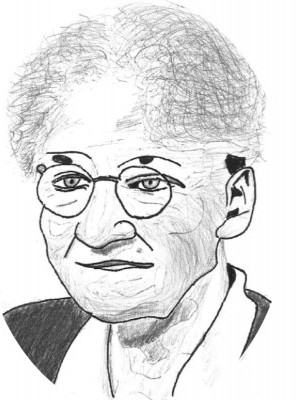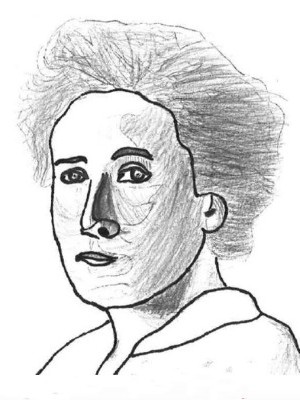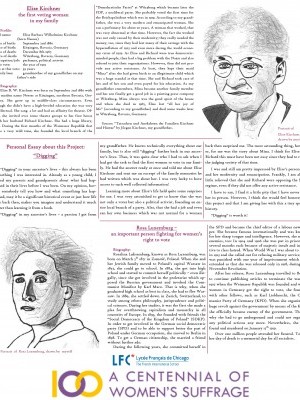Jade Fugère
Lycée Français de Chicago | Chicago, IL | 10th
Inspirational Family Member
Elise Kirchner, My Great-Great-Grandmother
Elise B. W. Kirchner was born on September 2, 1880, with her maiden name Neeser at Kitzingen, northern Bavaria, Germany. She grew up in middle-class circumstances. Even though she didn’t have a high-level education she was very intellectual. She sang a lot and had an affinity for theatre. Often, she invited over some theatre groups to her first house with her husband Richard Kirchner. She had a huge library, too. During the first months of the Weimar Republic, times were wild, and she founded the local branch of the Demokratische Partei at Würzburg, which became later the FDP, a neoliberal party.
She probably voted the first time for the Reichspräsident which was in 1919. According to my grandfather, she was a very modern and emancipated woman. She ran a perfumery for about 20 years. A woman who worked was very unconventional at that time. However, the fact that she worked was not only caused by her modernity; they really needed the money, too, since they had lost many of their savings with the hyperinflation of 1923 and even more during the world economic crisis of 1929. As Elise and Richard were true democratic-minded people, they had a big problem with the Nazis and also refused to join their organizations. However, they did not provide any active resistance. At least, they kept their maid “Mina” after she had given birth to an illegitimate child which was a huge scandal at that time. She and Richard took care of her and of her son and even paid for his education. As my grandfather remembers, Mina became another family member and her son finally got a good job in a printing press company at Würzburg. Mina always was the good spirit of the house and when she died in 1965, Elise lost “all her joy of life” (according to my grandfather) and died some weeks later in Würzburg, Bavaria, Germany.
Historical Figure I Admire
Rosa Luxemburg
Rosalina Luksemburg,known as Rosa Luxemburg, was born on March 5, 1871, in ZamoÊç, Poland. When she and her Jewish family moved to Poland’s capital, Warsaw, in 1873, she could go to school. In 1884, she got into high school and started to become politically active – even illegally, since she joined the proletarian cause which opposed the Russian government and invoked the Communist Manifest of Karl Marx. As a result, when she graduated high school as best in class, she had to flee Warsaw. In 1889, she settled down in Zurich, Switzerland, to study among other subjects: philosophy, jurisprudence and political sciences. During her studies, it was the first time she made a plea to overthrow capitalism and monarchy in all countries of Europe. In 1893, she founded with friends the “Social Democracy of the Kingdom of Poland” (SDKP). In order to get involved in the German Social DemocraticParty (SPD) and to be able to better support the part of Poland under German occupation, she moved to Berlin in 1898. To get a German citizenship, she married a friend without further ado.
In the ensuing years, she committed herself to the SPD and became the chief editor of a labor newspaper. She became famous internationally and was known for her sharp tongue and intelligence. However, she made enemies, too: In 1904 and 1906 she was put in prison for several months for insults and inciting class hatred. When World War I was about to start in 1913 and she called upon soldiers to refuse military service, she was punished with one year of imprisonment which was extended so that she was released only in 1918, during the November Revolution.
After her release, Rosa Luxemburg travelled to Berlin to continue publishing articles to terminate the war. In 1919 when the Weimarer Republik was founded and when women in Germany got the right to vote, she founded with other fellows, such as Karl Liebknecht, the Communist Party of Germany (KPD). When she organized a huge revolt against the government by means of the KPD, she officially became an enemy of the government. That is why she had to go underground and could not organize any political actions any more. Nevertheless, she was found and murdered on January 15 1919. Over one million people attended her funeral. Today, her day of death is a memorial day for all socialists.
SOURCES +
What the Project Means to Me
“Digging” in your ancestor’s lives – this always has been something I was interested in. Already as a young child, I asked my parents and grandparents about what had happened in their lives before I was born. In my opinion, having somebody tell you how and what has happened, may it be a significant historical event or just how life was back then, makes you imagine and understand it much better than learning it from a book.
“Digging” into my ancestor’s lives is a passion I got from my grandfather. He knows technically everything about our family, but is also still “digging” farther back into our ancestors’ lives. Thus, it was quite clear who I had to ask when I took on the task of finding the first woman to vote in our family. He had the answer ready at once and told me about Elise Kirchner and sent me an excerpt of the family memoirs he had written about her. I was very lucky to have access to such well collected information!
Learning more about Elise’s life held quite a few surprises for me. I was very astonished to learn that she was not only a voter but also a political activist, founding an entire local branch of a party. Also, that she had a job and even ran her own business, which was so unusual for a woman back then, surprised me. However, the most astounding for me was the story about Mina. I think for Elise and Richard, this must not have been easy since they had to resist the judgment of society of that time.
I was and still am pretty impressed by Elise’s personality and her modernity and emancipation. Frankly, I am also a little relieved that she and Richard were opposing the Nazi regime, even if they did not offer any active resistance.
I have to say, I feel a little sorry that I have never met her in person. However, I think she would feel honored by this project and by the fact that I am giving her a tiny spot in history. “Digging” is worth it!
Explore the Archive
Deadline Extended
There's still time to join Women Leading the Way.
Become a part of our storytelling archive. Enroll your class today.
Join the Project



